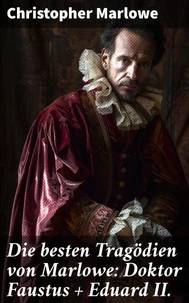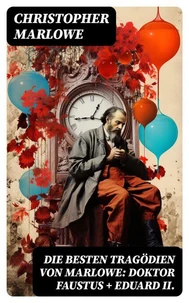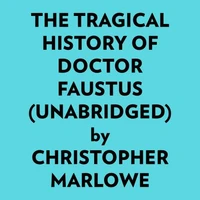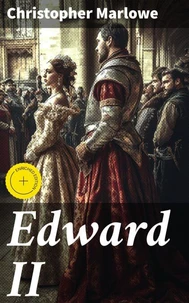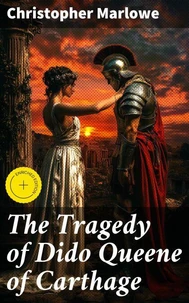Massacre at Paris
Par :Formats :
Disponible dans votre compte client Decitre ou Furet du Nord dès validation de votre commande. Le format ePub est :
- Compatible avec une lecture sur My Vivlio (smartphone, tablette, ordinateur)
- Compatible avec une lecture sur liseuses Vivlio
- Pour les liseuses autres que Vivlio, vous devez utiliser le logiciel Adobe Digital Edition. Non compatible avec la lecture sur les liseuses Kindle, Remarkable et Sony
 , qui est-ce ?
, qui est-ce ?Notre partenaire de plateforme de lecture numérique où vous retrouverez l'ensemble de vos ebooks gratuitement
Pour en savoir plus sur nos ebooks, consultez notre aide en ligne ici
- Nombre de pages29
- FormatePub
- ISBN859-65--4737794-8
- EAN8596547377948
- Date de parution16/09/2022
- Protection num.Digital Watermarking
- Taille277 Ko
- Infos supplémentairesepub
- ÉditeurDIGICAT
Résumé
In 'Massacre at Paris, ' Christopher Marlowe crafts a compelling historical drama set against the tumultuous backdrop of the French Wars of Religion. This play, characterized by its rich, lyrical language and dynamic characterizations, explores themes of power, betrayal, and the devastating impact of religious fanaticism. Marlowe's use of blank verse and command of dramatic pacing evoke a sense of urgency and tension, as the narrative unfolds with chilling historical accuracy, ultimately leading to the infamous St.
Bartholomew's Day Massacre of 1572. Its stark portrayal of political machinations and human cruelty positions it within the context of Elizabethan drama, linking it to broader discussions on governance and morality in the face of chaos. Christopher Marlowe, a contemporary of Shakespeare, was known for pushing the boundaries of dramatic form and content in his works. His own turbulent life-marked by intrigue, supposed espionage, and an untimely death-infuses his writing with a sense of urgency and a deep understanding of the human condition.
Marlowe's background, including his education at Cambridge, exposed him to classical texts and contemporary politics, which are reflected in the intricate plot and complex character dynamics of 'Massacre at Paris.' This play is essential reading for those interested in the intersection of history and drama, as well as scholars of the Renaissance period. Marlowe's exploration of power and morality resonates today, offering insight into the perennial struggles of governance and the human psyche.
'Massacre at Paris' invites readers to engage with the darker facets of ambition and the consequences of divisive ideologies, making it a vital addition to the canon of English literature.
Bartholomew's Day Massacre of 1572. Its stark portrayal of political machinations and human cruelty positions it within the context of Elizabethan drama, linking it to broader discussions on governance and morality in the face of chaos. Christopher Marlowe, a contemporary of Shakespeare, was known for pushing the boundaries of dramatic form and content in his works. His own turbulent life-marked by intrigue, supposed espionage, and an untimely death-infuses his writing with a sense of urgency and a deep understanding of the human condition.
Marlowe's background, including his education at Cambridge, exposed him to classical texts and contemporary politics, which are reflected in the intricate plot and complex character dynamics of 'Massacre at Paris.' This play is essential reading for those interested in the intersection of history and drama, as well as scholars of the Renaissance period. Marlowe's exploration of power and morality resonates today, offering insight into the perennial struggles of governance and the human psyche.
'Massacre at Paris' invites readers to engage with the darker facets of ambition and the consequences of divisive ideologies, making it a vital addition to the canon of English literature.
In 'Massacre at Paris, ' Christopher Marlowe crafts a compelling historical drama set against the tumultuous backdrop of the French Wars of Religion. This play, characterized by its rich, lyrical language and dynamic characterizations, explores themes of power, betrayal, and the devastating impact of religious fanaticism. Marlowe's use of blank verse and command of dramatic pacing evoke a sense of urgency and tension, as the narrative unfolds with chilling historical accuracy, ultimately leading to the infamous St.
Bartholomew's Day Massacre of 1572. Its stark portrayal of political machinations and human cruelty positions it within the context of Elizabethan drama, linking it to broader discussions on governance and morality in the face of chaos. Christopher Marlowe, a contemporary of Shakespeare, was known for pushing the boundaries of dramatic form and content in his works. His own turbulent life-marked by intrigue, supposed espionage, and an untimely death-infuses his writing with a sense of urgency and a deep understanding of the human condition.
Marlowe's background, including his education at Cambridge, exposed him to classical texts and contemporary politics, which are reflected in the intricate plot and complex character dynamics of 'Massacre at Paris.' This play is essential reading for those interested in the intersection of history and drama, as well as scholars of the Renaissance period. Marlowe's exploration of power and morality resonates today, offering insight into the perennial struggles of governance and the human psyche.
'Massacre at Paris' invites readers to engage with the darker facets of ambition and the consequences of divisive ideologies, making it a vital addition to the canon of English literature.
Bartholomew's Day Massacre of 1572. Its stark portrayal of political machinations and human cruelty positions it within the context of Elizabethan drama, linking it to broader discussions on governance and morality in the face of chaos. Christopher Marlowe, a contemporary of Shakespeare, was known for pushing the boundaries of dramatic form and content in his works. His own turbulent life-marked by intrigue, supposed espionage, and an untimely death-infuses his writing with a sense of urgency and a deep understanding of the human condition.
Marlowe's background, including his education at Cambridge, exposed him to classical texts and contemporary politics, which are reflected in the intricate plot and complex character dynamics of 'Massacre at Paris.' This play is essential reading for those interested in the intersection of history and drama, as well as scholars of the Renaissance period. Marlowe's exploration of power and morality resonates today, offering insight into the perennial struggles of governance and the human psyche.
'Massacre at Paris' invites readers to engage with the darker facets of ambition and the consequences of divisive ideologies, making it a vital addition to the canon of English literature.


